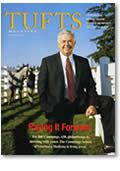 A STUNNING BENEFACTOR A STUNNING BENEFACTOR
In his spring address to Phi Beta Kappa honorees at Tufts, Sheldon Krimsky said, “Virtue means you have to consider your contributions beyond yourself.” Surely, William Cummings, the stunning benefactor to the Veterinary School, must have read this pertinent definition of virtue. I have profound admiration for Mr. Cummings’ gift to our remarkable university.
Rev. Richard Kimball, A56
Jamaica Plain, MA
TWO POINTS OF NOTE
I wanted to comment on two articles in the summer 2005 issue.
“Press ‘One’ for English” was excellent, and I intend to read Professor Schildkraut’s book. As a Latin American regionalist, I believe that we should separate our language education policy from the argument. I agree that the “American Dream” sought by immigrants is not attainable without working English, and is most attainable with very good English. Accordingly, bilingual education is not the best answer for most of our first-generation Latin American children. Since their parents are as monolingual as Americans, and the residency pattern is in Hispanic clusters, the children grow up here speaking and writing both Spanish and English poorly. Mainstreaming would work much better. Although this does not require that English be our official language, the law of the land ought somehow to protect our Hispanic immigrant children.
In “A Double War,” two of Marcel Boisvert’s statements about his life and our history caught my attention. Mr. Boisvert distinguishes Dresden from other bombed cities that were “military targets.” This revisionist distinction should not exist in his mind or ours in the context of Nazi Germany and WW II.
He was glad to finally learn that his plane did not bomb Dresden, because he is “not a killer.” But tail gunners are, of course, killers by virtue of their task. Rather than seeking acquittal for crimes he didn’t commit, he should simply accept our thanks. Had he and warriors like him not been the ferocious, effective killers we sent to defend us, our (unrevised) history would have been darker than his darkest self-recriminations. I was born in 1947 in a free America. Thank you, Mr. Boisvert.
Kenneth N. Haynes, F05
Fayetteville, NC
CORRECTION NEEDED
In reference to the amount of bombs dropped on Dresden (“Allied planes dropped 3,907 pounds of bombs and incendiary devices on Dresden…”) [“A Double War,” summer 2005], the Dresden raids were conducted by the RAF (night) and the USAF (day). More than 1,000 planes participated. If your piece was correct, then each plane would have carried 3.9 pounds of bombs, about the weight of a hand grenade. The right number is probably 3,907 tons of bombs.
Robert Clabault, A50
South Yarmouth, MA
A GOOD DEED REPAID?
When the Boston Red Sox won the World Series, I recalled an experience a few years ago at the Space Coast Stadium in Viera, Florida, about 20 minutes from my house. I think the Red Sox won because their owner, John W. Henry, formerly of the Florida Marlins, is a super-nice guy.
It was spring training and the St. Louis Cardinals were playing. Because of multiple sclerosis, I am in a wheelchair and use a wheelchair van; the stadium is handicap accessible and I don’t generally have any difficulty getting a seat. I asked my friend Paul to drop me off at the ticket booth, where I purchased a wheelchair seat. I then asked for a seat for Paul, and was told the game was sold out. I said that shouldn’t make any difference because there would be room next to the wheelchair for our lawn chair. Once again, I was told, “We are all sold out.” Paul tried to convince me the situation was futile, but I replied, “This isn’t right. Just let me say a little prayer.” So I wheeled away from the booth and put my head down. Suddenly, I felt a hand on my shoulder.
“Can I help you?” the man asked.
I replied, “Oh, my goodness, I know who you are.”
“That’s right, I’m John Henry, and I own this ball club and stadium, so what can I do for you?”
I told him what had happened.
He said, “No one should be denied going to a baseball game.” Then he snapped his fingers, and five people appeared. He told them to get me a special parking permit, and he instructed a man to wheel me into the stadium. I was situated right behind home plate, with an adjacent seat for Paul. We were treated as if we were VIPs.
Good deeds, which most of us believe are their own reward, sometimes earn a bonus. I believe John Henry’s success with the Red Sox was a repayment for his “good deed” to us.
Hank Brandli, E59
Melbourne, Florida
WHERE ARE THE WOMEN?
Judging from the latest issue of Tufts Magazine (and earlier ones), Tufts is only a men’s university. Oh, well. I just went to graduate school. What do I know?
Marie Scudder, G70
Ipswich, MA
|

